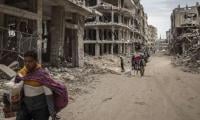The Sindh government and the World Bank (WB) have agreed to work together on various development projects in the province, which include the revamping of the Karachi Water and Sewerage Board (KWSB) and rehabilitation of the Guddu and Sukkur barrages.
The development came on Friday when a delegation of the World Bank Group led by its president, David Malpass, met Sindh Chief Minister Syed Murad Ali Shah at the CM House. The two sides discussed various ongoing projects worth $2.77 billion and approved new projects estimated at $1.93 billion.
Water board
The CM said the Karachi Water and Sewerage Services Improvement Project (KWSSIP) was a $1.6 billion programme to be carried out in three phases and its first phase worth $100 million had been approved, which envisaged institutional reforms at the KWSB by strengthening its human resource and technical capacity, and improving its planning department.
He requested the WB to approve all the phases of the project so that it could make a big impact. The donor agency’s team approved the provincial government’s proposal regarding the KWSSIP.
Discussing the second phase of the KWSSIP, the CM said the provincial government had planned to focus on a bulk water supply system for Karachi from the Indus River and Hub Dam, along with improvements in the water and sanitation network and filtration plants.
“We want to explore the possibility of using phase 1 financing kept for priority works to be used for the bulk water supply system from Kinjhar resource,” he said. The meeting approved the CM’s proposal.
KNIP and KUMP
The meeting also discussed the Karachi Neighbourhood Improvement Project (KNIP), which is a $98 million project under execution to improve the urban infrastructure and local governments, and create greater public spaces in the city.
The WB delegation also approved a mass transit project, titled the Karachi Urban Mobility Project (KUMP), estimated at $381 million. The donor agency asked the Sindh government to start its implementation.
The CM said that the mass transit system involving the Red Line, Green Line and Orange Line bus services and the Karachi Circular Railway would provide the people of Karachi seamless connectivity between residential, commercial and industrial areas.
Sukkur and Guddu barrages
A presentation was given during the meeting about the Sukkur Barrage. The CM informed the World Bank Group president that the Sukkur Barrage was one of the most important barrages of the country and it was considered a lifeline for the rural economy. He added that the Guddu Barrage also played an important role in the agricultural economy of the province.
He said there was a proposal to construct a new barrage in Sukkur but it had huge financial implications, therefore, the provincial government had decided to rehabilitate the Sukkur and Guddu barrages.
The WB agreed to finance $328 million for the rehabilitation of both the barrages.
Karachi reforms
Murad said the Sindh government had requested the WB to undertake the Karachi Diagnostic Study in 2016 leading to the Karachi Transformation Strategy which developed a holistic plan to revitalise the city.
The CM maintained that the plan had helped roll out dedicated reforms and investments in water & sanitation, urban transport, and local government sectors, which would utimately make Karachi the preferred choice for prospective businesses.
CLICK
The CM said the Competitive and Livable City of Karachi (CLICK) project was a $230 million project, under which the provincial government had planned to initiate reforms in the local government system in all the six district municipal corporations of the city and the Karachi Metropolitan Corporation.
“It includes a component for conditional performance grants to local agencies for investment in the infrastructure,” Murad said. “This funding for improving the urban and municipal infrastructure at DMC level is expected to upgrade the livability and simultaneously improve the governance of local government institutions.”
Agricultural projects
A large segment of Sindh’s population depended on agriculture and there was a continuous need to invest in agriculture productivity, the CM told the WB delegation.
“This requires investment in irrigation infrastructure, improved access to better inputs and mechanised farming, and improvement in agriculture value chains, however, most significant aspect that we wish to highlight is increase in productivity in agriculture yields,” he said.
Another project discussed at the meeting was the Water Sector Improvement project (WSIP) estimated at $283 million. The WSIP is aimed at improving water availability by improving the major left bank canals system.
The Sindh Irrigated Agriculture Productivity Enhancement Project worth $187 million is meant to provide required investment for on farm water management. The Sindh Agriculture Growth Project (SAGP) estimated at $76 million is aimed at improving various agriculture value chains and livestock of province.
Resilience project
The Sindh Resilience Project (SRP) worth $98 million was developed to invest in strengthening emergency preparedness, undertake flood protection works and build small water reservoirs.
The CM said approximately 15 water reservoirs had been established in Thar and other areas, adding that it had been evaluated that small reservoirs in arid regions were of high value and Sindh would seek additional financing for this component.
Health and nutrition
The CM discussed with the delegation the $61.6 million Sindh Enhancing Response to Reduce Stunting Project (SERRSP) and the $36.24 million Nutrition Support Program as he termed both the projects very important.
Murad said the Sindh government was implementing a six-year (2016-2021) multi-sectoral Sindh Accelerated Action Plan to address stunting and malnutrition with the objective of reducing stunting rate from the existing 45 per cent to 30 per cent by 2021.
He added that the WB-supported Nutrition Support Program was initiated in 2014 and the SERRSP was funded by the Sindh government.
“The 2018 National Nutrition Survey shows that the overall rate of stunting in Sindh has reduced from 48 to 45.5 per cent, however it is higher than national figure of 40 per cent,” he said. “The support on the nutrition program may need to be extended for another period of 4 years or so,” the CM said, to which the WB delegation asked the provincial government to formally submit a request in that regard.
Social protection initiative
The CM said the Sindh government was presently evolving a rights-based social protection programme which was aimed at achieving food security, maternal, neonatal and child health, and rights and wellbeing of women agricultural workers.
“It will subsequently focus on other poverty reduction efforts and creating opportunities for the educated youth to eventually finalise a comprehensive approach to social protection,” he said, adding that the Social Protection Strategy Unit (SPSU) had been established under the CM’s coordinator on social protection.
The responsibility for the design, testing and evaluation of the social protection strategy and programmes would rest with the SPSU of the CM Secretariat and the government had finalised the initial design phase for testing the programme interventions, the meeting was told.
The CM said his government was exploring possibilities of technical assistance support for the social protection programme, to which the WB chief suggested the submission of a detailed working paper.
Intermediary cities uplift
Murad said the Sindh government was planning to undertake investments in intermediary cities for a balanced growth in the province. “This includes investment in urban infrastructure, urban facilities and spaces, market infrastructure for improving livability, economic growth and job opportunities.”
He was of the view that any increase in economic opportunities in major cities had to be done in tandem with an increase in livability in intermediary cities. The WB president urged the provincial government to submit a concept paper for an intermediary cities improvement programme so that it could be discussed.
The WB delegation included South Asia Vice President Hartwig Schafer, Country Director Pakistan Illango Patchamuthu and others. The CM was assisted by Chief Secretary Mumtaz Shah, provincial cabinet members Nisar Khuhro, Ismail Rahu, Saeed Ghani, Imtiaz Shaikh, Azra Pechuho, Shehla Raza, Nasir Shah and Murtaza Wahab, Planning and Development Board Chairperson Nahid Shah, the finance secretary, education secretary, home secretary and others.
The image shows a tobacco company worker holding cigarettes. — AFP/FileHYDERABAD: An illegal cigarette factory...
This image shows the dead body. — AFP/FileAn incident unfolded in Quaidabad on Tuesday, resulting in one fatality...
Edhi Marine Services team is busy in a rescue operation in Karachi on March 17, 2024. — PPI An e-taxi driver...
Shah Abdul Latif University Khairpur building can be seen in this image. — Facebook/Shah Abdul Latif University,...
Representational image of a handcuffed man. — Pexels/FileHYDERABAD: A police operation was carried out in Hyderabad,...
A representational image showing a person handcuffed and standing behind bars. — AFP/FileThe SSGC has continued...







